Caster Selection Guide for Heavy-Duty Applications

When it comes to heavy-duty applications, the choice of casters is far more than a mere afterthought; it's a critical decision that can significantly impact the performance, safety, and longevity of your equipment. HICKWALL TECH CASTER INDUSTRIAL CO., LTD. understands the complexity of caster selection for heavy-duty tasks, and in this guide, we will navigate the key factors to consider. Whether you're in manufacturing, warehousing, construction, or any industry that relies on robust mobility solutions, this comprehensive caster selection guide will empower you to make informed choices, ensuring the right caster for your specific needs.
1. Know Your Load Capacity Requirements
The foundation of selecting the right heavy-duty caster lies in understanding your load capacity requirements. How much weight will the caster need to support? It's crucial to choose casters with a load capacity that comfortably exceeds your heaviest anticipated load. HICKWALL TECH offers a wide range of casters with varying load capacities to meet the diverse needs of heavy-duty applications.
2. Consider Floor Conditions
The type of flooring your equipment will operate on is another vital consideration. Different floor surfaces, such as concrete, tile, wood, or carpet, can affect the performance and wear of your casters. For example, hard tread wheels are suitable for smooth surfaces, while soft tread wheels are ideal for floors that need protection. HICKWALL TECH provides casters with a variety of wheel materials designed to suit different floor conditions, so your equipment moves smoothly and safely.
3. Wheel Diameter Matters
Wheel diameter plays a significant role in how casters handle loads and traverse obstacles. Larger wheel diameters provide easier maneuverability over uneven surfaces and are often preferred for heavy-duty applications. Smaller wheels, on the other hand, are more suitable for applications that require precision movement in limited spaces. HICKWALL TECH offers a range of wheel diameters to cater to your specific mobility needs.
4. Swivel or Rigid Casters
The choice between swivel and rigid casters depends on your mobility requirements. Swivel casters allow for 360-degree rotation, making them ideal for applications that require agility and frequent changes in direction. Rigid casters, by contrast, provide stability and straightforward linear movement. The balance between swivel and rigid casters can significantly affect the control and maneuverability of your equipment, so choose wisely based on your operational needs.
5. Brake Systems for Safety
In many heavy-duty applications, safety is paramount. Brake systems are essential to prevent unintended movement and secure your equipment in place when necessary. HICKWALL TECH offers casters with a range of braking mechanisms, including total lock brakes that immobilize both the wheel and swivel mechanism and directional locks for controlled movement.
6. Environmental Factors
Environmental conditions play a crucial role in caster selection. Consider factors such as temperature, exposure to chemicals, and the presence of debris. For extreme temperatures, you may need high-temperature or low-temperature-resistant casters. In environments with corrosive materials, stainless steel or plastic casters could be ideal. HICKWALL TECH provides casters tailored to withstand various environmental challenges.
7. Ergonomics and Noise Reduction
In some heavy-duty applications, ergonomic considerations are essential. Casters with shock-absorbing properties can reduce the vibration transferred to equipment, protecting sensitive materials or delicate instruments. Additionally, if noise reduction is critical in your workspace, HICKWALL TECH offers casters designed for quiet operation.
8. Customization Options
While there are a plethora of standard caster options, you may find that your application requires a tailored solution. HICKWALL TECH is well-equipped to provide custom caster solutions, taking into account your specific needs, from special wheel materials to unique caster designs. Customization ensures that you get the ideal caster for your heavy-duty application.
9. Weight Distribution and Center of Gravity
Consider the weight distribution on your equipment and the location of the center of gravity. Proper weight distribution and placement of casters can significantly affect stability and maneuverability. HICKWALL TECH experts can provide guidance on caster placement and alignment for optimal performance.
10. Durability and Longevity
The longevity of your casters directly impacts cost and equipment downtime. Investing in durable, high-quality casters can reduce the need for frequent replacements and maintenance, ultimately saving you time and money. HICKWALL TECH's commitment to quality ensures that our casters are built to last, even under heavy loads and demanding conditions.
Conclusion
Selecting the right casters for heavy-duty applications is a decision that should not be taken lightly. It's a choice that directly influences safety, efficiency, and the overall performance of your equipment. At HICKWALL TECH CASTER INDUSTRIAL CO., LTD., we understand the complexities of caster selection for heavy-duty tasks, and we are committed to providing tailored solutions that meet and exceed your specific needs. With our wide range of caster options, including customization, we empower you to make informed decisions, ensuring that your equipment moves smoothly, safely, and reliably in the most demanding environments.

